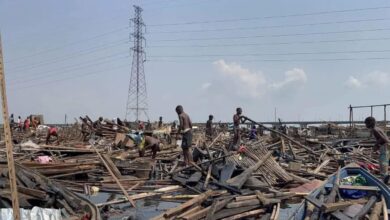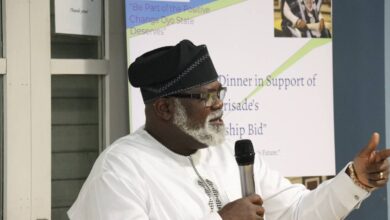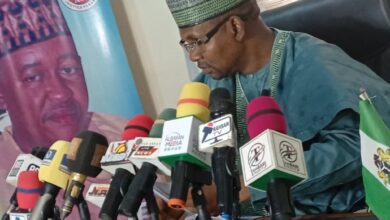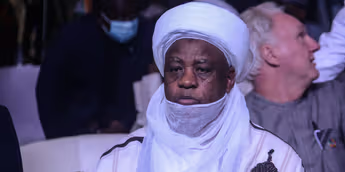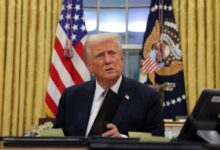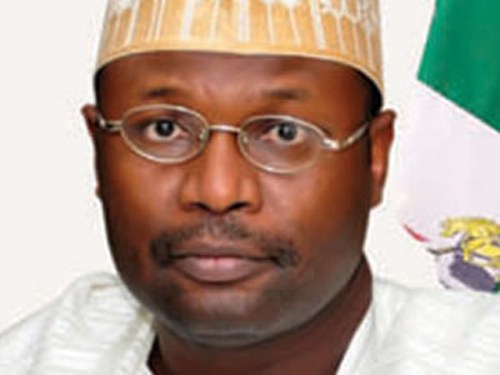
The ratification of Yakubu’s appointment as the INEC boss came after the Council of States meeting was held in October last year as stipulated by the constitution.
Sokoto State Governor, Aminu Waziri Tambuwal, who spoke after the meeting, explained that the appointment was in conformity with the provisions of the 1999 Constitution of Nigeria, particularly Sections 154 (1 and 3) and 156 (3) that confer on the president the powers to appoint a chairman and national commissioners of INEC, in consultation with the Council of State.

Tambuwal had said: “The situation in INEC as at today is such that requires this emergency meeting to approve the nominations by Mr. President because the law requires that a minimum of four commissioners should form a quorum in INEC, which is not the case as at today.”
Having assumed office as substantive chairman of INEC in October 2015, Professor Yakubu’s major headache was to address the major concern of Nigerians over the ability of the electoral umpire to deliver credible and conclusive elections.
The Kogi governorship election that served as a litmus test for INEC under Professor Yakubu had set the tone for inconclusiveness which became a regular feature in the performance rating of the commission. Nigerians are not in a hurry to forget the Kogi election which was mired in controversy mainly due to the dramatic death of the All Progressives Congress (APC) candidate, Prince Abubakar Audu.
There was a crescendo of criticisms faulting the way INEC managed the situation. Many critics had argued that there was no reason to declare the election inconclusive as INEC did despite Audu’s death. Regrettably, during the election, members of the political class in the confluence state, like their counterparts elsewhere in the country, displayed their demonstrable inability to adhere to laws guiding electoral processes, a development that had led to violence in many polling units across the state.
Many had thought that the Kogi experience would enable INEC to improve on its logistical preparations in order to avoid a repeat of inconclusiveness in Bayelsa. Unfortunately almost the same issues arose to render the Bayelsa election inconclusive as well. In the case of Bayelsa, the political class even took their violence to hurricane proportions in their desperation to win at all costs.
Although many observers could not blame INEC staff for refusing to conduct election in areas where adequate security was not provided, others wondered whether the electoral body was actually working in tandem with security agencies.
To many critics therefore, the Bayelsa election was a show of shame as far as INEC, security agencies and politicians were concerned. Apart from electoral materials being hijacked, violence was perpetrated on innocent citizens despite the deployment of thousands of security personnel. There were also reports of failure to deliver election materials on time for the Bayelsa election at several pooling units even as there were reported cases of sporadic shootings in some areas during voting apparently to scare away voters.
The case of Southern Ijaw Local Government Area particularly comes to mind where elections were cancelled due to unprecedented violence during the re-run. Of course, the result was the declaration of the Bayelsa governorship election also as inconclusive.
Next was the conduct of the Rivers State governorship and legislative elections that sent shock waves across the nation due to the monumental level of violence that greeted it. Little wonder that a public affairs analyst while writing on the re-run dramatically titled his article as: “The Rivers of Blood.”
But the Professor Yakubu led INEC had made several efforts to justify its inability to conduct conclusive elections during his one year in office. Yakubu had told Daily Trust in an exclusive interview that elections were rendered inconclusive in Nigeria because voters were being given the opportunity under his leadership to cast votes that count. “Votes now count”, he said, stressing that the process of electing people into positions of authority was getting better. According to Yakubu, the dynamics of elections in Nigeria evolved from the 2015 elections, particularly with the introduction of technology during the elections.
He said: “In the past, politicians used to disrupt elections where they were not strong so they could win on the basis of votes from their areas of strength. In response INEC said if you disrupted election anywhere, the people would be ultimately given another opportunity because every vote in Nigeria must count because it is the votes that Nigerians cast that determine who their leader becomes.”
How INEC get it right in Edo, Ondo
Going by previous elections, fears of political analysts deepened when INEC suddenly announced the postponement of the Edo State election, which was earlier scheduled to hold on September 10, to November 24.
The claim by INEC that security intelligence reports received from both the Department of State Services and the Nigeria Police Force were not favourable for the conduct of the election made many to conclude that the Edo elections might also be declared inconclusive.
This fear was reinforced when the ex-Governor of Edo State, Adams Oshiomhole, who appeared on a television programme, alleged that the main opposition party, the Peoples Democratic Party, was planning to rig the election and import militants from neighbouring states to Edo State as part of its plans to mar the electoral process.
Like Edo, similar fears were expressed in Ondo, especially when the outcome of primaries that produced the flag bearers of the major political parties became contentious, thereby setting the stage for possible crisis.
Interestingly, the outcome of both elections seemed to have suggested that INEC has been able to break the jinx of inconclusive elections. Several individuals, groups and organizations have applauded the commission for successfully conducting the governorship elections in Edo and Ondo States. The pertinent question, however, is how did INEC get it right this time around?
For INEC, the successes recorded in the Edo and Ondo elections were as a result of what desperate politicians failed to succeed in doing, namely: violence on Election Day.
Spokesman of INEC, Nick Dazang, said: “What stands out is that we witnessed minimal violence, hence there were no many cancelations in both Edo and Ondo elections.”
According to Dazang, the same processes and template applied in previous elections were the same used in Edo and Ondo “except that violence did not mar the elections in Edo and Ondo.”
Dazang also disclosed that before the conduct of the Edo and Ondo governorship elections, INEC had reviewed its security architecture.
“As you are aware, security personnel at pooling units are not allowed to carry arms, a situation that desperate politicians took undue advantage of to cause violence that often led to cancellations.
“But to address this ugly trend, there were ‘Special Intervention Units’ by the police at every pooling unit to checkmate violence”, Dazang said, adding that the triumph for the successes made by INEC in Edo and Ondo was also enhanced by cooperation from the various stakeholders.
So will this feat be sustained in subsequent elections and especially in the 2019 general elections? Dazang said INEC would continue to draw lessons from every election leading to the 2019 general elections. “Even in these elections (Edo and Ondo), the Smart Card had malfunctioning problems even as there was the tendency for people to induce voters. We will intensify voter education”, he said.
*This report first appeared on Daily Trust online on December 3, 2016.


